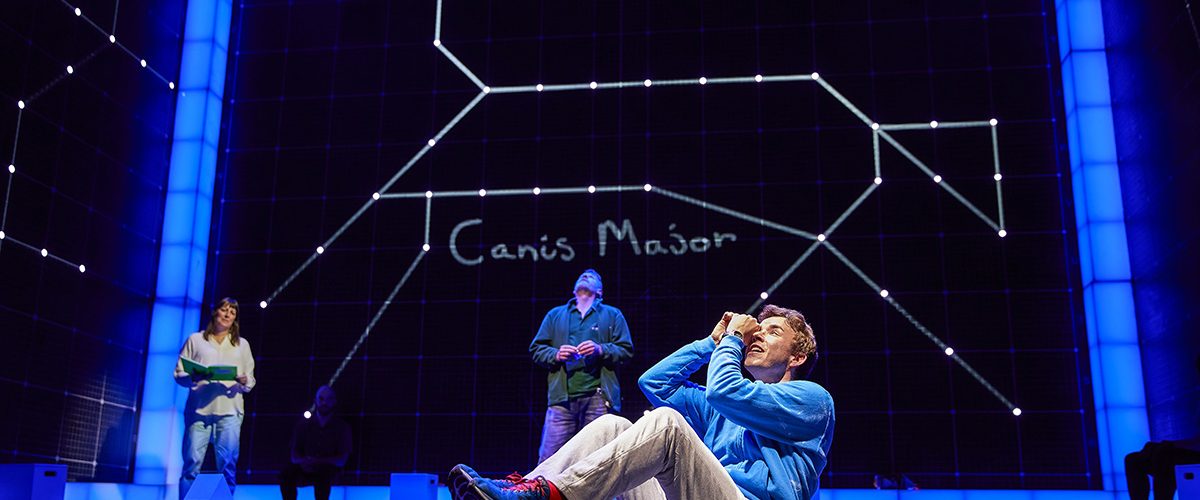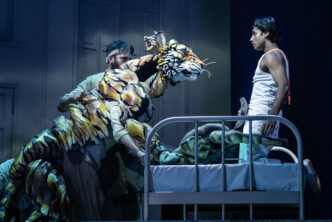Liz Ratcliffe laughs and cries at The Curious Incident of the Dog in the Night-Time which she finds to be a masterpiece of acting and choreography, wrapped in a high-tech set
I enjoyed reading Mark Haddon’s best-selling novel, The Curious Incident of the Dog in the Night-Time, almost 20 years ago and was intrigued to find out how the book had been adapted for the stage. I was not disappointed: it is a masterpiece in acting and choreography, wrapped up with an incredible high tech stage set which creates a sharp insight into the mind and perceptions of a young man who sees the world differently.
The story centres around Christopher Boone, a neurodiverse teenager who discovers his neighbour’s dog stabbed to death and determines to find the culprit (using his ‘detecting skills’, learnt from his intense reading of Sherlock Holmes). This might sound like a rather dark and disturbing ‘who dunnit’, and yes – there is shadow and anguish for the main characters throughout. However, that is only one element of the play – we are presented with humour throughout, and what we are really being provided with is an insight into the mind of someone neuro-divergent and seeing the world from his perspective.
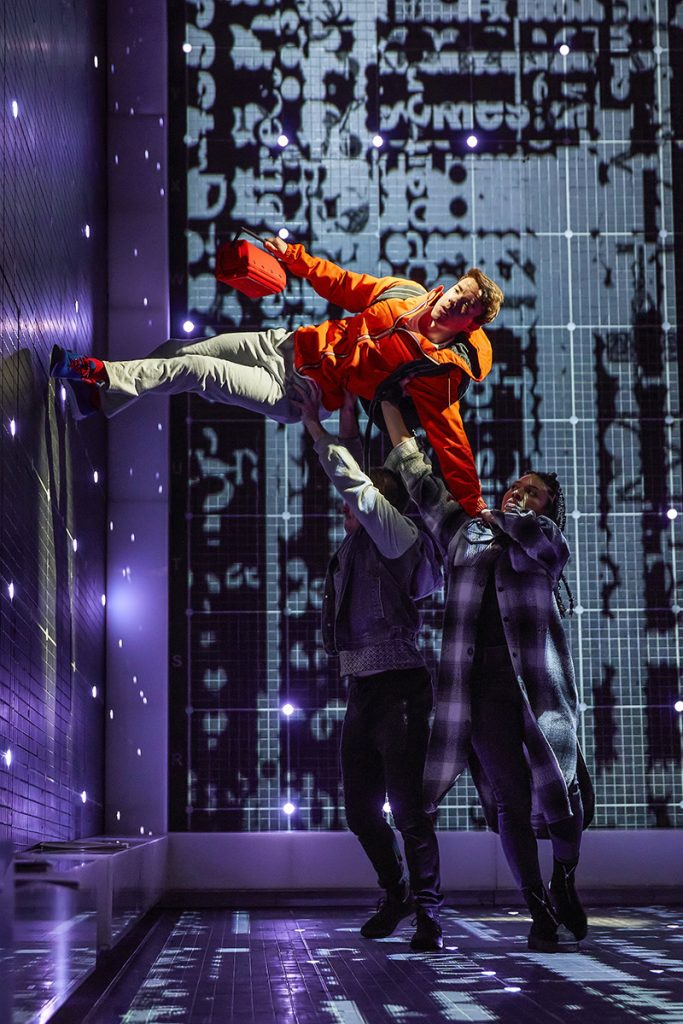
David Breed is superb as Christopher, conveying his ‘otherness’ with astonishing energy and sensitivity, showing what it must be like to live in a world where you can’t bear to be touched, you have no friends except for a pet rat, you understand facts but not feelings, and simply cannot lie. His performance conveys Christopher’s vulnerability but also his capacity to find the magical within a world that may seem to us just rather mundane.
Near the start of the play, we witness Christopher’s father telling him his mother is dead. He only discovers she isn’t when he finds a cache of her letters hidden in his father’s bedroom – a scene which, under Marianne Elliott’s highly inventive direction, powerfully evokes emotional turmoil as the letters cascade down over him in a whirl of illuminated words. We then witness Christopher’s journey of discovery to find out that the things he knows and loves might not be as simple as they seem – truth and lies and issues of trust are key in the overall story.
This tour of the show is supported by Access All Areas, who aim to make disruptive theatre with arts who have autism or a learning disability. The full cast is incredibly strong, and works together in complete synchronisation. Christopher’s father, Tom Peters demonstrates the great strain of parenting and protecting a child who is ‘different’, ranging from sheer anger to softness and complete love.
Kate Kordel, who plays Christopher’s mother, conveys a very moving sense of maternal conflict: she loves her son but can’t live with him, leading to some heart-breaking scenes. The wonderful Rebecca Root shows grace and calm common sense as Christopher’s teacher, and also acts as the narrator of the go-to place in Christopher’s mind to calm him down in the difficult situations he find himself in.
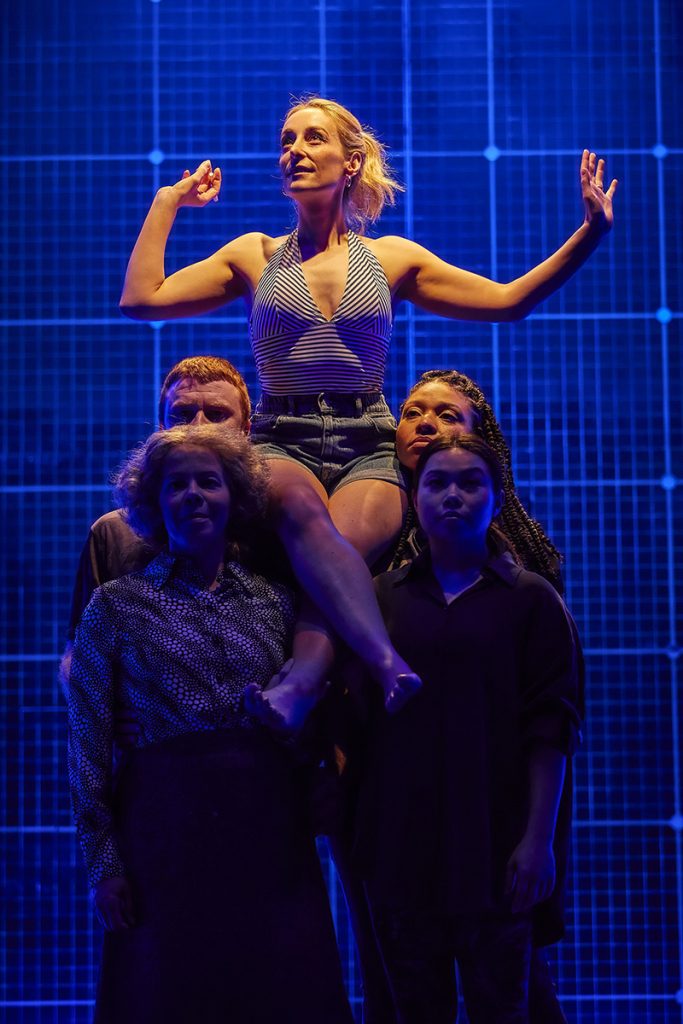
The stage set initially seems so simple – basically a square white box, but as the show progresses, you realise it is an exceptionally high tech set, filled with hundreds of LED lights to show you Christopher’s thoughts and emotions to help you to learn more about what is going on inside his head. Designer, Bunny Christie and lighting designer, Paule Constable use a variety of techniques from strobe lighting to words flying across the stage via digital projection, to allow us to experience Christopher’s struggle with sensory exhaustion and feeling overwhelmed in a world that might seem calm to others. In the first act, we see Christopher building his train track to keep him calm, and watch how the complexity and chaos of that intensifies with his increasing levels of frustration and confusion.
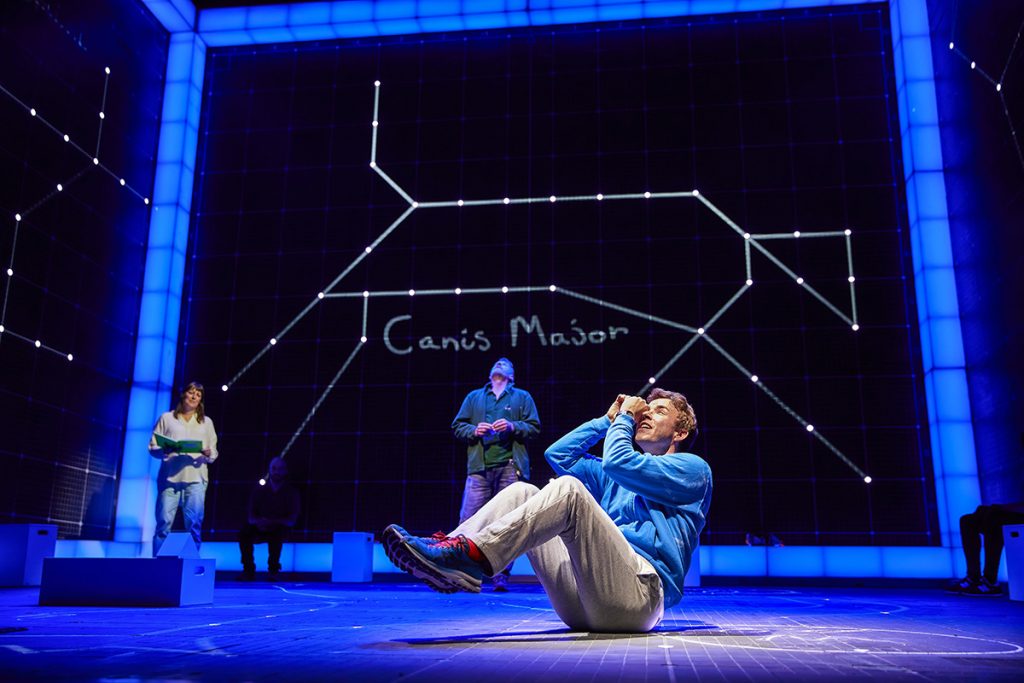
Movement Directors, Scott Graham and Steven Hoggett deserve particular praise for the expertly choreographed production. Timing of actors is precise throughout in terms of both movement and spoken word, and the ways in which the cast helps Christopher move around the stage create truly magical moments, whether it be floating in outer space, or literally walking the vertical walls of the stage. The way the rest of the cast help move him around the stage helps you realise that every part of this play is coming from the mind of Christopher, and without him there wouldn’t be a story.
The Opera House was packed last night, and it was wonderful to see this modern masterpiece of a play being watched by all ages – from teenagers to the elderly, and everyone in between. I was taken on an emotional rollercoaster, but left with a sense of joy (note to readers – don’t leave the auditorium too soon ….as many did last night) and it’s a play that is going to stay in my thoughts for a long time to come.
The Curious Incident of the Dog in the Night-Time is at the Opera House, Manchester from 8-12 March 2022 before continuing on its UK tour.

